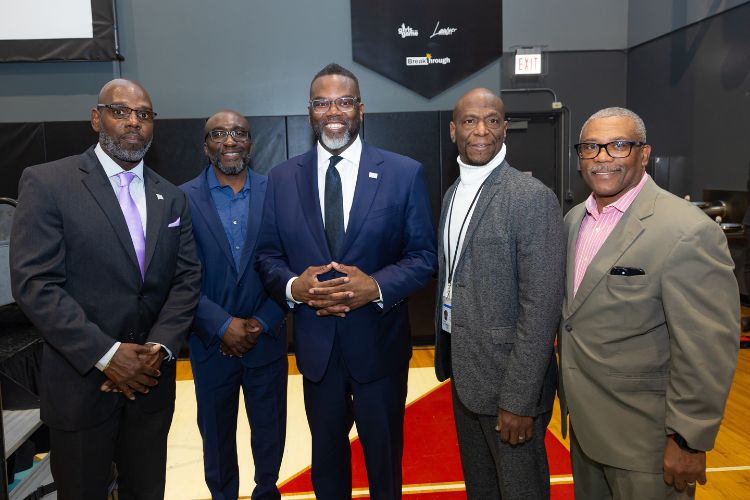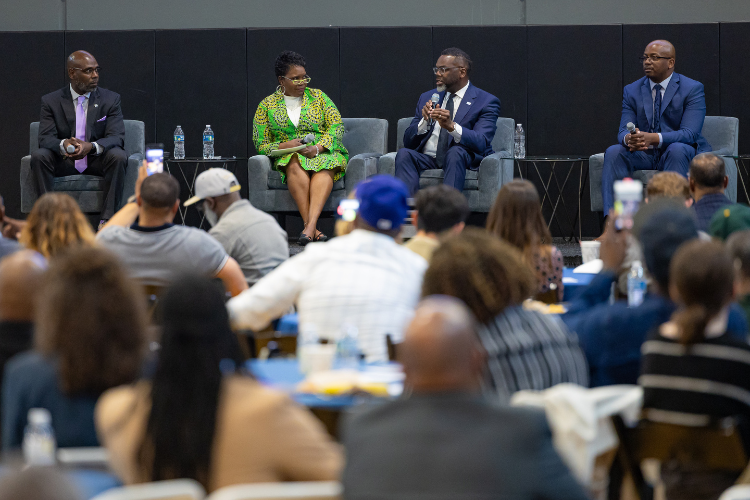Mayor Brandon Johnson participates in a panel discussion during the Building Bridges, Breaking Barriers – A Unified Path to Hope and Reentry Summit at Breakthrough FamilyPlex in East Garfield Park; April 2025 (Photos Courtesy of The City of Chicago).
For many, exiting prison can be as tense as entering it, regardless of the circumstances.
Returning citizens often face a variety of challenges, from trauma, finding stable employment and accessing mental health support. Not to mention wanting the opportunity to reconnect with and seek the support of their families after years apart.
The Mayor’s Office of Reentry hosted “Building Bridges, Breaking Barriers: A Unified Path to Hope and Reentry,” bringing together reentry professionals, including keynote speaker Dr. Sandra Brown, who overcame incarceration and now helps others navigate reentry. The event featured expert-led panels on key issues, such as holistic healing, gender-specific support for women and sustainable funding amid federal uncertainty.
Rooted in Resilience: A New Beginning for Women After Incarceration
On the second panel discussion, Necole Muhammad (co-founder of Chicago CRED Women’s Center and Author), Artinese Myrick (Live Free Illinois), La Tanya Jenifor-Sublett (Chicago Torture Justice Center), and LaToya Baines (Alliance of Local Service Organizations) gave valuable insight on how women can help with healing in the community and funding for those safe spaces.
Baines stated, “Increasing funding and expanding services for women must go beyond awareness—it requires creating spaces where women can truly heal. Being trauma-informed isn’t enough; we must be trauma-responsive in our policies, environments, and support systems. Women need to feel safe. We need services that reconnect mothers with their children and provide the deeper support necessary for healing and reintegration.”
Brown of the Women’s Justice Institute shared her journey as the first incarcerated woman in Illinois to earn a master’s degree and be accepted into a doctoral program.
As director of training and education and a national trainer, she works nationwide to equip system workers with tools to support justice-impacted individuals. She also highlights the need to address vicarious trauma and expand education and training for incarcerated and formerly incarcerated women.
“Many of us understand that poverty shapes every step of a woman’s path to prison. Without access to safe, stable housing, medical care or the ability to meet basic needs for herself and her children, the stress compounds, impacting her health, well-being and future. It’s a cascading effect that traps her in instability. I’m proud to be part of work that addresses these barriers. And sometimes, something as simple as treating someone with dignity—speaking to them as a person—can profoundly change the course of their life,” said Brown.
Investment to Impact: Reentry Funding that Transforms Systems

The panel focused on securing funding to ensure all reentry individuals have access to resources that allow them to seek employment and support in environments where they feel comfortable, even if it’s outside their usual surroundings.
Orlando Mayorga (Polk Brothers Foundation), Avik Das (Justice Advisory Council), NeAngela Dixon (MacArthur Foundation), and Mark Sanders II (Department of Family Support Services, City of Chicago) were among the panelists.
Mayorga stated, “There’s a lot of potential to be more inclusive, recognizing the shared community that unites all of us—families, individuals, and communities striving for the best. We must focus on building relationships to access funding opportunities and the support they need. More funders are adopting trust-based philanthropy, providing general operating support rather than limiting grants to specific projects. As Dr. Sandra Brown highlighted, there’s also a growing push to connect local organizations with national movements, ensuring they can collaborate and engage without relying solely on their limited resources.”
Kenneth Durant, a former prisoner and summit attendee, shared a pivotal moment from January 2025 when he experienced a shift. Over the next few months, he focused on listening to the right voices and distancing himself from distractions. Reflecting on his past, he acknowledged his mistakes but emphasized perseverance. “I’ve spoken to thousands of young people, not because I’m perfect, but because change is possible,” he said.
Durant shared that he started his business by staying humble and open during this time. He connected with others on their healing journeys. “Today, I move forward, and I hope when you speak my name, it’s with hope because that brought me here.”
The summit finished with a Lakeside Chat featuring Mayor Brandon Johnson, Deputy Mayor of Community Safety Garien Gatewood, and Director of Reentry Joseph Mapp, moderated by Yolanda Fields, executive director of Breakthrough.
When asked about the key to genuine collaboration and what can be learned from his approach to building bridges across agencies and communities, Mapp stated, “It starts with co-creation—listening to the community. Today, I’m announcing a partnership with the Department of Family and Support Services to create a women-centered reentry support system. We’ll continue listening and acting. We’re putting out QR codes and emails, you name it, so people can stay connected.
Mayor Johnson stated how reentry fits into his broader vision for equity and transformation in Chicago, “It’s about access. I am committed to repopulating the West and South Sides. We’re building thousands of affordable homes and creating pathways for returning residents to get jobs, including contractor roles. Community colleges are seeing record Black male enrollment. We’re working on a new trade campus at Malcolm X College to train people for these careers. That’s real, full-circle equity.”

Reflecting on what message they would give to every person returning to their role in the world today, Mapp said, “It’s your turn and your responsibility. Lean in and look for ways to add value.”
Deputy Mayor Gatewood stated, “Every door you open is your responsibility to leave open for someone behind you.”
Mayor Johnson added, “You are seen. You will never be ignored again—not as long as I’m the Mayor of Chicago.”
Mayor Johnson also shared a personal note, recalling the struggles of his brother Leon, who passed away unhoused and unseen due to untreated trauma and addiction.
“He was my hero. That’s why I made it my purpose to ensure our people are always seen, always counted.”
During the summit, the city announced the anticipated release of a request for proposal for a Women-Focused Community Reentry Center. This center aims to strengthen and expand the work at the City’s Community Reentry Support Centers (CRSCs), which the Department of Family and Support Services oversees.
For more information and to stay updated on this topic, please visit this link.
